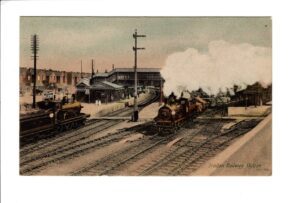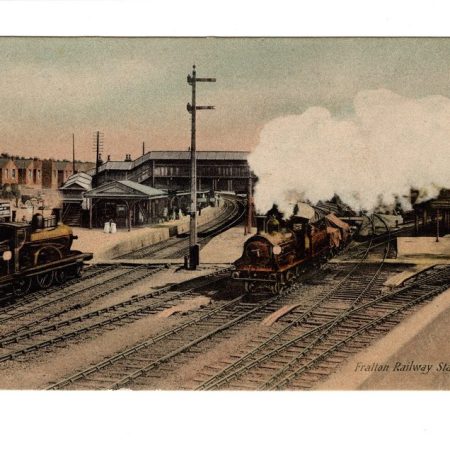Hopefully it won’t have escaped your attention that 2025 is being marked as ‘Railway 200’, cast as the 200th anniversary of the birth of the modern railway. It’s an initiative coordinated by the rail industry, working in partnership with others, to recognise 200 years since the opening of the Stockton and Darlington Railway on 27 September 1825, and to look at the past, present and future of rail.
Stockton and Darlington are a long way from Hampshire! So, what’s happening locally? And in particular for Hampshire Archives Trust followers, what’s happening in relation to the history of railways in our county?
There’s an easy way to find out, via the Railway 200 activities map. This is being updated regularly as more and more events are added. Brilliantly, Hampshire groups have been active in responding to the Railway 200 year – including with the support of the Hampshire Archives Trust.
On 10-11 May 2025, Micheldever Station will celebrate the 185th anniversary of its opening with a two-day event at the station and its environs. Featuring talks, activities and exhibits, it’s a great reflection of the way the local community has come together to explore the impact of the railway on the area. Hampshire Archives Trust has played a direct role, with a grant to support an interpretation board highlighting the natural and cultural heritage of the railway in Micheldever.
Events are taking place on the current rail network, and beyond. That includes Hampshire’s heritage railways, like the Watercress Line. They’ve done a great job of taking Railway 200 into the community beyond the Line. They’ve already run a poetry competition, with an anthology to be produced later in the year. Over the past year or so they’ve been working with groups to produce a textile timeline of railway travel with a Hampshire twist. There’s more about the panels and their creation in blogs previously featured on the Hampshire Archives Trust site, here and here. The panels will be touring Hampshire libraries and venues – including Hampshire Archives in Winchester – for the next year.

Work of volunteers working with the Watercress Line
In keeping with the importance of working with the community, Community Rail Partnerships (CRPs) and station adopters in Hampshire have been supporting Railway 200 initiatives. For anyone not familiar with the idea behind CRPs and station adopters, they are community-based groups – station adopters contributing to a particular station, and CRPs working along routes. They aim to connect communities with their railways, restoring pride in a station or route and enhancing the environment on the railway and beyond.
Netley station adopters – within the Three Rivers CRP – are working to collect stories of Netley station and its railway, including the impact it had on peoples’ lives. They’re going to be at a talk on Netley’s railway history on 30 May. The Three Rivers CRP recently supported the ‘Stories from the Station’ performance at Bitterne station. This was a community-focused performance, created by the Unexpected Places theatre company, centred on Bitterne, its community and its connections to the railway. They worked with members of the community in Bitterne to showcase their voices and impressions of the area, mixed with its railway history. Significantly for me, that included some details of railway workers from the area – crucial to recognise their often-overlooked contribution. There’s more on the Stories from the Station performance here.

Image courtesy Railway Work, Life & Death project
The Portsmouth Area Railway Pasts project will also be making a contribution to Railway 200. The project, supported by the University of Portsmouth’s Heritage Hub, involves research undertaken between the Havant Local History Group and the University. We’re looking into the lives and times of local railway workers who feature in the Railway Work, Life & Death project. Thanks to the hard work of dedicated volunteers, that project, also collaborative, has created a vast resource about accidents to British and Irish railway workers before 1939, including a free database with transcribed details of incidents. That currently includes hundreds of Hampshire railway staff, with more to come in future updates.

Image courtesy Railway Work, Life & Death project
Portsmouth Area Railway Pasts takes this as its starting point and is looking at the personal stories – the people behind the accidents. Our group – Ann, Neil, Alan, Geoff and me – have been meeting regularly to discuss who to research, what resources to draw upon and now how to ‘write up’ our findings for public audiences. We’ve uncovered some fascinating stories, including railway workers who fought in the battle of Jutland, those who were ‘passing through’ Hampshire because of their work and those who were firmly rooted in the Havant and Portsmouth area, employees who returned to railway work after life-changing disabilities as well as very much less serious incidents.
I think it’s fair to say we’ve all been surprised at how interesting these supposedly ordinary lives have been, including their family and community connections. That makes them all the more significant, as they are representative of everyday experiences. As part of Railway 200, and will the support of the Hills to Harbour CRP, we’re now working on getting some of the people stories of the railway into stations on the route over coming months. These will be as posters, provisionally in Havant, Petersfield and Portsmouth and Southsea stations, so watch those spaces. We’re also producing a pop-up exhibition, to display at venues in the Petersfield, Havant and Portsmouth area. We’re also developing web-based content, to bring these lives to the widest possible audience. All in all, we’re looking forward to sharing these railway workers and their stories!
There’s more to come in Hampshire during Railway 200. Later in the year an exhibition train, ‘Inspiration’, will start touring the rail network, including coming to Hampshire. More events will be put on during the Railway 200 year, so keep your eyes peeled. It’s brilliant to see railway history, local history and community activities coming together like this!

Bio: Dr Mike Esbester is Senior Lecturer in History at the University of Portsmouth and Associate Editor of the Journal of Transport History. His research focuses on the history of transport and mobility in modern Britain, and in particular railway history. He co-leads the Railway Work, Life & Death project, a collaboration between the University of Portsmouth, the National Railway Museum and the Modern Records Centre at the University of Warwick, and working with The National Archives of the UK and the RMT Union. Working with community groups is a really important part of Mike’s practice as an historian.
You can hear more about the Railway Work, Life & Death project and railway history in Hampshire in this Hampshire Archives Trust podcast.

